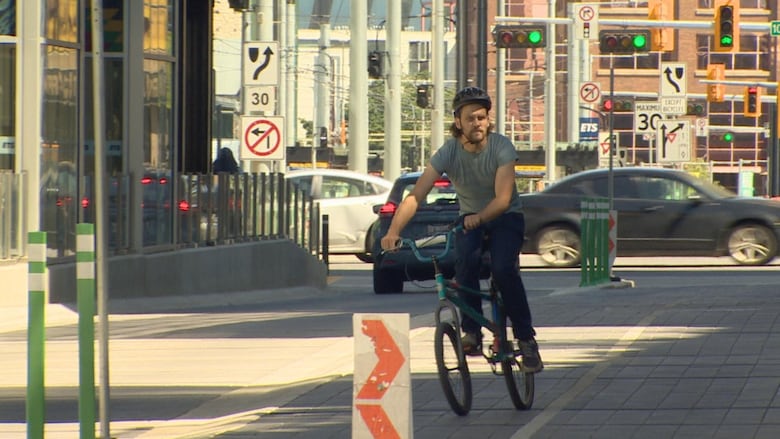Edmonton bike advocates celebrate Ontario court ruling as province mulls similar legislation
Ontario court deemed government's plan to remove three major Toronto bike lanes unconstitutional

The Alberta government says it is looking to Ontario to see how to impact where bike lanes are placed — but bike advocates in Edmonton are hoping the province will reconsider its stance.
An Ontario court deemed that province's plan to remove three major Toronto bike lanes unconstitutional. A decision the Ontario government says it will appeal.
In Alberta, Transportation Minister Devin Dreeshen says the province is mulling over similar legislation, that could impact where Edmontonians see bike lanes in the city.
"I want to make sure that both the city of Edmonton and Calgary are co-ordinated with the provincial government when it comes to our road networks," Dreeshen told CBC Calgary on Wednesday.
"Obviously, hundreds of millions of dollars goes into road projects in Edmonton and Calgary to make sure that we can add more lanes to make life that much better for people living in the province, as well as for new people coming into the province."
The province has previously raised concerns with the City of Edmonton about the planning of bike lanes, including the 132nd Avenue redesign that proposes lane reductions on key commuter corridors.
But some bike advocates like Keith Heslinga with Bike Edmonton say they want the province to stay in their lane and are encouraged by the court decision in Ontario.
"We're actually pleasantly surprised that the court has decided that the actions of the Ontario government were not correct and were worth stopping," Heslinga told CBC News.
"We've been in contact with Bike Toronto and Bike Calgary, ever since Minister Dreeshen started this whole kerfuffle, and so we were appraised of the work they were doing. And I think in our heart of hearts, we were hopeful that it would go this way, but we weren't necessarily expecting it."

Dreeshen said the Ontario court's decision will not dissuade the Alberta government.
"The advantage of going second is something that we can see that piece of legislation in Ontario. What are some improvements that we would make here in Alberta? So we're still just in that early stages to figure out what exactly that legislation would look like."
Dreeshen said he is open to meeting with Edmonton Mayor Amarjeet Sohi in the coming months to ensure the city and province is aligned on maintaining Alberta's road capacity.
"We are also encouraging cities to pursue alternatives like designated bike routes and off-street pathways that don't reduce lanes on major roads," Dreeshen said.
Edmonton city council approved $100 million in funding as part of the 2023-2026 Capital Budget for active transportation network expansion, which focuses on adding new routes to complete missing links in the network.
"The city is connecting with the provincial government in various ways, including data sharing and responding to inquiries," said Natalie Lazurko, with the City of Edmonton's transportation planning and design team, in a statement to CBC.
"We will continue to work collaboratively with our provincial partners while we move forward as planned with the design and construction of new routes to connect and expand the network in our community."
Through the Active Transportation Network Expansion Program, 32 new connections are underway at various stages, contributing to about 40 kilometres of new network connections, Lazurko said.
Construction of these new connections began in spring 2024 and is anticipated to be open for use by the end of the 2025 construction season.
Additional locations for further network expansion are in design now in preparation for construction starting in spring 2026, Lazurko said.
With files from Bryan Labby and Travis McEwan

